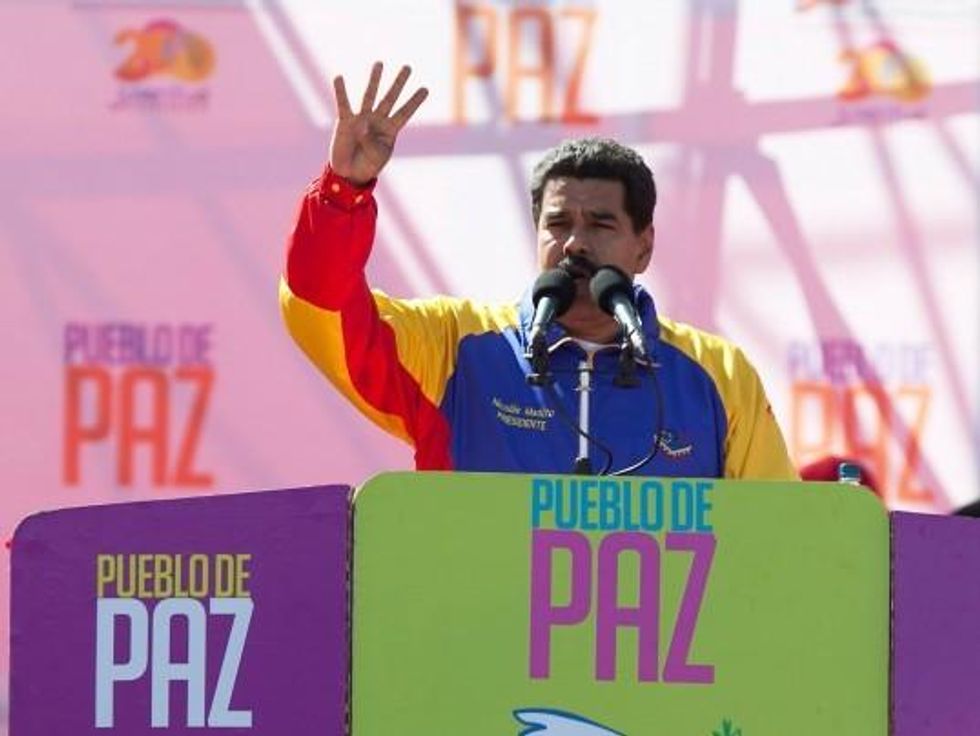Venezuelan Opposition Leader Arrested for Fomenting Unrest
Foreign Policy experts emphasize the largely orchestrated demonstrations come with strong US backing

According to reports, Lopez was taken on charges of fomenting unrest against the government and spurring violence that has killed at least four people. Days before being arrested, Lopez taunted the government on Twitter writing: "Don't you have the guts to arrest me?"
The reportedly student-led protests have escalated into violence over the course of the month as they called for the withdrawal of elected socialist President Nicolas Maduro.
As Lopez submitted to arrest, tens of thousands of demonstrators dressed in white blocked traffic in the streets of Caracas while thousands of Maduro supporters, symbolically clad in the red of the Socialist Party, held a counter demonstration.
Foreign policy experts emphasize that the Maduro-led government is fending off the same sort of attacks that were frequently levied at former President Huge Chavez, despite holding strong majority approval, the backing of key institutions and the support of neighboring governments.
On Sunday, the Mercosur governments (Brazil, Argentina, Uruguay, Paraguay and Venezuela) released a statement denouncing the "recent violent acts" in Venezuela as "attempts to destabilize the democratic order."
According to Venezuelan-born sociologist Maria Paez Victor, while some demonstrators carry genuine complaints, the protests were largely orchestrated and that the appearance of massive revolt is a tactic used to delegitimize the government.
The real opposition, she says, is the U.S. and other western governments.
"Venezuela represents the rejection of neo-liberal economics and corporate capitalism," Paez Victor writes. "The corrupt elite- governed Venezuela, darling of corporate capitalism, that had impoverished its own population during 40 years, is no more."
Paez Victor continues:
These violent tactics have no hope of succeeding because, unlike 1999, the Venezuelan people are now organized into many groups: the communal councils, the communes, the thousands of health, security, militia, sports, educational, cultural committees. The Bolivarian Revolution has fostered, not a mass of people, but an organized organic population that makes decisions about its living conditions along with its government because Venezuela is now a fully functioning participatory democracy.
Without a popular base, support of the military or any regional backing, Paez Victor says that the opposition's "only card is to hope Venezuela is invaded by U.S. Marines."
"Of course we all know who the U.S. government supports in Venezuela," writes Mark Weisbrot, co-director of the Center for Economic and Policy Research in Washington, DC. "[T]here's $5 million in the 2014 US federal budget for funding opposition activities inside Venezuela, and this is almost certainly the tip of the iceberg - adding to the hundreds of millions of dollars of overt support over the past 15 years."
Weisbrot notes that recent statements made by U.S. Secretary of State John Kerry and other state department spokespeople have further inflamed the situation by making it clear that Washington is backing a regime change.
"It remains to be seen how far [the opposition] will go this time to win by other means what they have not been able to win at the ballot box, and how long they will have Washington's support for regime change in Venezuela," he adds.
_____________________
An Urgent Message From Our Co-Founder
Dear Common Dreams reader, The U.S. is on a fast track to authoritarianism like nothing I've ever seen. Meanwhile, corporate news outlets are utterly capitulating to Trump, twisting their coverage to avoid drawing his ire while lining up to stuff cash in his pockets. That's why I believe that Common Dreams is doing the best and most consequential reporting that we've ever done. Our small but mighty team is a progressive reporting powerhouse, covering the news every day that the corporate media never will. Our mission has always been simple: To inform. To inspire. And to ignite change for the common good. Now here's the key piece that I want all our readers to understand: None of this would be possible without your financial support. That's not just some fundraising cliche. It's the absolute and literal truth. We don't accept corporate advertising and never will. We don't have a paywall because we don't think people should be blocked from critical news based on their ability to pay. Everything we do is funded by the donations of readers like you. Will you donate now to help power the nonprofit, independent reporting of Common Dreams? Thank you for being a vital member of our community. Together, we can keep independent journalism alive when it’s needed most. - Craig Brown, Co-founder |

According to reports, Lopez was taken on charges of fomenting unrest against the government and spurring violence that has killed at least four people. Days before being arrested, Lopez taunted the government on Twitter writing: "Don't you have the guts to arrest me?"
The reportedly student-led protests have escalated into violence over the course of the month as they called for the withdrawal of elected socialist President Nicolas Maduro.
As Lopez submitted to arrest, tens of thousands of demonstrators dressed in white blocked traffic in the streets of Caracas while thousands of Maduro supporters, symbolically clad in the red of the Socialist Party, held a counter demonstration.
Foreign policy experts emphasize that the Maduro-led government is fending off the same sort of attacks that were frequently levied at former President Huge Chavez, despite holding strong majority approval, the backing of key institutions and the support of neighboring governments.
On Sunday, the Mercosur governments (Brazil, Argentina, Uruguay, Paraguay and Venezuela) released a statement denouncing the "recent violent acts" in Venezuela as "attempts to destabilize the democratic order."
According to Venezuelan-born sociologist Maria Paez Victor, while some demonstrators carry genuine complaints, the protests were largely orchestrated and that the appearance of massive revolt is a tactic used to delegitimize the government.
The real opposition, she says, is the U.S. and other western governments.
"Venezuela represents the rejection of neo-liberal economics and corporate capitalism," Paez Victor writes. "The corrupt elite- governed Venezuela, darling of corporate capitalism, that had impoverished its own population during 40 years, is no more."
Paez Victor continues:
These violent tactics have no hope of succeeding because, unlike 1999, the Venezuelan people are now organized into many groups: the communal councils, the communes, the thousands of health, security, militia, sports, educational, cultural committees. The Bolivarian Revolution has fostered, not a mass of people, but an organized organic population that makes decisions about its living conditions along with its government because Venezuela is now a fully functioning participatory democracy.
Without a popular base, support of the military or any regional backing, Paez Victor says that the opposition's "only card is to hope Venezuela is invaded by U.S. Marines."
"Of course we all know who the U.S. government supports in Venezuela," writes Mark Weisbrot, co-director of the Center for Economic and Policy Research in Washington, DC. "[T]here's $5 million in the 2014 US federal budget for funding opposition activities inside Venezuela, and this is almost certainly the tip of the iceberg - adding to the hundreds of millions of dollars of overt support over the past 15 years."
Weisbrot notes that recent statements made by U.S. Secretary of State John Kerry and other state department spokespeople have further inflamed the situation by making it clear that Washington is backing a regime change.
"It remains to be seen how far [the opposition] will go this time to win by other means what they have not been able to win at the ballot box, and how long they will have Washington's support for regime change in Venezuela," he adds.
_____________________

According to reports, Lopez was taken on charges of fomenting unrest against the government and spurring violence that has killed at least four people. Days before being arrested, Lopez taunted the government on Twitter writing: "Don't you have the guts to arrest me?"
The reportedly student-led protests have escalated into violence over the course of the month as they called for the withdrawal of elected socialist President Nicolas Maduro.
As Lopez submitted to arrest, tens of thousands of demonstrators dressed in white blocked traffic in the streets of Caracas while thousands of Maduro supporters, symbolically clad in the red of the Socialist Party, held a counter demonstration.
Foreign policy experts emphasize that the Maduro-led government is fending off the same sort of attacks that were frequently levied at former President Huge Chavez, despite holding strong majority approval, the backing of key institutions and the support of neighboring governments.
On Sunday, the Mercosur governments (Brazil, Argentina, Uruguay, Paraguay and Venezuela) released a statement denouncing the "recent violent acts" in Venezuela as "attempts to destabilize the democratic order."
According to Venezuelan-born sociologist Maria Paez Victor, while some demonstrators carry genuine complaints, the protests were largely orchestrated and that the appearance of massive revolt is a tactic used to delegitimize the government.
The real opposition, she says, is the U.S. and other western governments.
"Venezuela represents the rejection of neo-liberal economics and corporate capitalism," Paez Victor writes. "The corrupt elite- governed Venezuela, darling of corporate capitalism, that had impoverished its own population during 40 years, is no more."
Paez Victor continues:
These violent tactics have no hope of succeeding because, unlike 1999, the Venezuelan people are now organized into many groups: the communal councils, the communes, the thousands of health, security, militia, sports, educational, cultural committees. The Bolivarian Revolution has fostered, not a mass of people, but an organized organic population that makes decisions about its living conditions along with its government because Venezuela is now a fully functioning participatory democracy.
Without a popular base, support of the military or any regional backing, Paez Victor says that the opposition's "only card is to hope Venezuela is invaded by U.S. Marines."
"Of course we all know who the U.S. government supports in Venezuela," writes Mark Weisbrot, co-director of the Center for Economic and Policy Research in Washington, DC. "[T]here's $5 million in the 2014 US federal budget for funding opposition activities inside Venezuela, and this is almost certainly the tip of the iceberg - adding to the hundreds of millions of dollars of overt support over the past 15 years."
Weisbrot notes that recent statements made by U.S. Secretary of State John Kerry and other state department spokespeople have further inflamed the situation by making it clear that Washington is backing a regime change.
"It remains to be seen how far [the opposition] will go this time to win by other means what they have not been able to win at the ballot box, and how long they will have Washington's support for regime change in Venezuela," he adds.
_____________________

